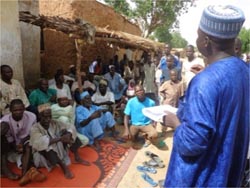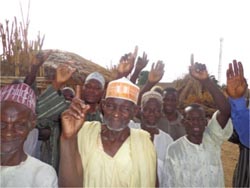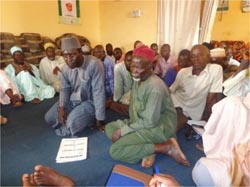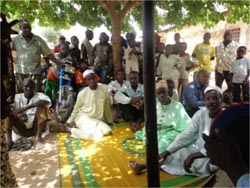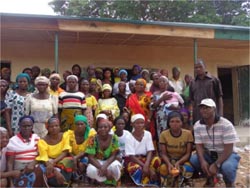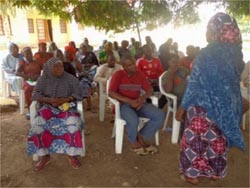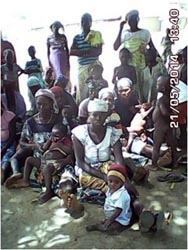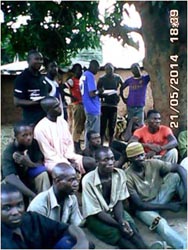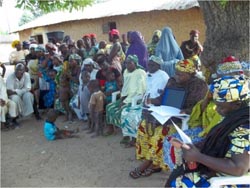Community mobilization
N2Africa-Nigeria is conducting an awareness campaign to inform the rural farming communities on yield enhancing technologies packaged by N2Africa for grain legume production. Therefore N2Africa organized community sensitization. The sensitization was organized in 85 communities across three states namely: Niger state, Kaduna state and Kano State. The interaction during the sensitization was meant to inform smallholder farmers on the ability of the N2Africa technology packages to close experienced yield gaps and significantly increase grain legume yield far above what traditionally known practices can offer.
The community sensitization also gave resource-poor farmers the opportunity to share experiences with N2Africa. The farmers reported that they experience wide yield gaps due to production constraints such as low yield, poor quality of seeds, soil fertility problem, high cost of agro-chemicals, erratic climatic conditions, pest infestation and low-market value for farm produce.
It is very important to share the objectives and project goals with the farmers. Therefore we also clearly identified the expected role of the farmer, the different milestones to be accomplished and expected outcomes to the participating farmers at community level. In addition, we outlined the materials and methods for the project implementation. We also discussed the details of demonstrations trials in farmers’ fields, the agronomy protocol for the trial, crop varieties for specific agro-ecologies/locations, management practices for different crops and other sundry issues. There was a session for questions and answers where participants interacted freely and asked questions on different farming systems and crop production for the purpose of clarity.
|
Community mobilization Kano State |
|
Community mobilization Kaduna State |
|
Community mobilization Niger State |
Pre - season training in Nigeria
| Prior to planting date the project organized pre–season training for participating farmers in all the project action sites. The aim of the training is to build the capacity of the stakeholders on the appropriate use of N2Africa package of technologies, so that demonstration and adaptation trials will be correctly installed. The overview of trials to be installed is given in Table 1. |
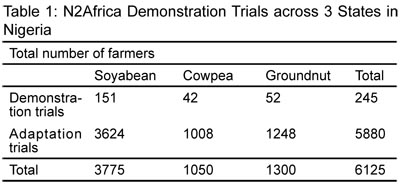 |
Participants were drawn from 13 local government areas across the 3 states. The participants (males, females and youth) included lead farmers, extension agents (EAs), community seed producers and the contract sprayers from selected communities. In addition, agro-allied companies used the training as an opportunity to showcase their products and introduce new technologies in pest management practices.
Different subjects were taught during the training to boost the knowledge of resource-poor farmers. Subjects covered included legume agronomy in the Nigeria savannah, farming systems, pest management practices, safe use of herbicides and pesticides, community seed production, cereal-legume cultivation and post-harvest technology. The community seed production project (CSPP), to be facilitated by the project, was highly appreciated by farmers as opportunity for community business investment when introduce by N2Africa. CSPP was acknowledged with a loud applause by the farmers, who see the opportunity to engage themselves in commercial seed production in their respective communities. The training also included sessions for group discussion, where participants felt free to share their experiences in the field during farming activities.
For ease of communication, most presentations were made in the local language that the majority of the people understand. This approach contributed positively to information spread among the participants who do not understand English. All trainees were made to have a good understanding of the kind of data to be collected from farmers’ fields and possible challenges that may arise in the course of implementation of the project. The quality of responses from the participants and the interactions during discussions gave the organizer of the training the assurance that trainees had a good understanding of the subjects covered during the training.
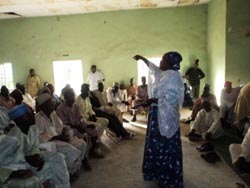 |
Pre-season training in Kano State (left), Kaduna State (middle) and Niger State (right) |
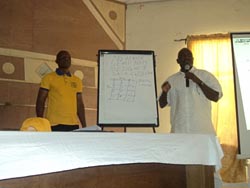 |
Report of training on data collection & use of ICT tools
Field demonstration trials on crop production in farmers’ fields form a critical part of delivery and dissemination component of the N2Africa project. The success of a field experiment relies strongly on the kind and quality of data collected and how the trial has been set-up and managed.
A training of trainers’ session was conducted for lead extension agents (EAs) in Kano, Kaduna and Niger States of Nigeria. Lead EAs were trained mainly on field trial design, data collection and use of agronomy tools. The trained EAs were then expected to further build the capacity of all extension agents involved in N2Africa trials’ installation and data collection.
The training placed much emphasis on data collection from the field demonstrations and agronomy trials. The data from such field demonstrations will be used to evaluate crop performance from the applied treatments. The N2Africa research and data specialist stressed that research data should capture planting dates across locations, germination counts (in %), planting density, date of flower emergence and other crop phenological data, stress conditions such as drought, flood and pest infestation.
In terms of data collection, it is very important that yields are measured correctly. Rather than measuring yields from net-plots, it was suggested to measure yields from the full plots. When measuring a larger area, the measuring error decreases. The harvested yield is to be properly bagged and labeled according to plots, crop and location, along with the farmer’s identification code. Another point which reduces measurement errors is the use of precise, digital, weighing scales. It is very important that all the scales used are of the same type!
To explain yield variations, additional data are needed. Therefore, soil sample collection was discussed as well. Emphasis was placed on soil depth, sampling tools and possible number of samples to constitute composite soil samples. 50 cm soil depth was suggested by N2Africa research and data specialist, but the consensus among the EAs was 0 – 30 cm soil depth. The samples need a proper label, representing the field or site, as well as the farmer’s code and name. In addition, there were both theoretical and practical demonstrations on the use of GPS. Prior to this; it was recommended that calibration of the GPS should be in the metric system to eliminate errors in locating degrees and minutes on the digits.
Trainees were also given the opportunity to comment on the Field Book of technology, the main data collection tool for the demonstration trials. The trainees gave useful comments, for example on the farmer’s typology, and the number of demonstration trials, adaptation and diagnostic trials across the different leguminous crops and locations. Based on these comments, some adjustments were made to the Field Book.
The training ended with an interactive session where the participants were given the opportunity to express their opinions or concerns on the various topics discussed. In the end, the EAs were satisfied throughout the training session and gained new knowledge which is expected to be ploughed back into the project.
Emmanuel Sangodele

